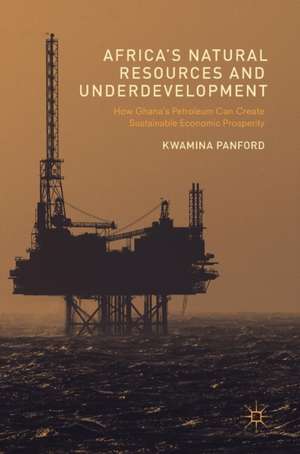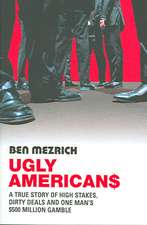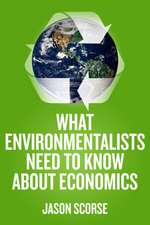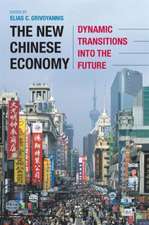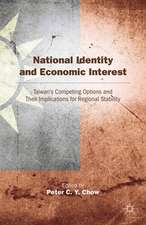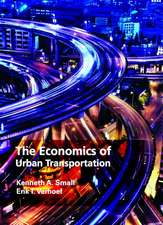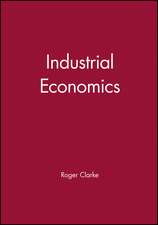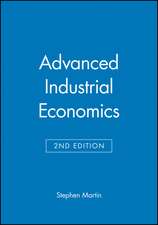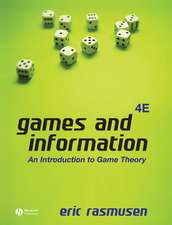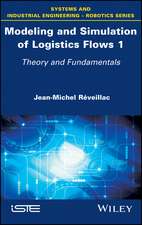Africa’s Natural Resources and Underdevelopment: How Ghana’s Petroleum Can Create Sustainable Economic Prosperity
Autor Kwamina Panforden Limba Engleză Hardback – 3 feb 2017
This book explores how African countries can convert their natural resources, particularly oil and gas, into sustainable development assets. Using Ghana, one of the continent’s newest oil-producing countries, as a lens, it examines the "resource curse" faced by other producers - such as Nigeria, Angola, and Equatorial Guinea - and demonstrates how mismanagement in those countries can provide valuable lessons for new oil producers in Africa and elsewhere. Relying on a broad range of fieldwork and policymaking experience, Panford suggests practical measures for resource-rich developing countries to transform natural resources into valuable assets that can help create jobs, boost human resources, and improve living and working conditions in Ghana in particular. He suggests fiscal, legal, and environmental antidotes to resource mismanagement, which he identifies as the major obstacle to socioeconomic development in countries that have historically relied on natural resources.
Preț: 727.66 lei
Preț vechi: 887.39 lei
-18% Nou
Puncte Express: 1091
Preț estimativ în valută:
139.24€ • 145.74$ • 115.89£
139.24€ • 145.74$ • 115.89£
Carte tipărită la comandă
Livrare economică 31 martie-14 aprilie
Preluare comenzi: 021 569.72.76
Specificații
ISBN-13: 9781137540713
ISBN-10: 1137540710
Pagini: 272
Ilustrații: XVI, 249 p.
Dimensiuni: 148 x 210 x 16 mm
Greutate: 0.45 kg
Ediția:1st ed. 2017
Editura: Palgrave Macmillan US
Colecția Palgrave Macmillan
Locul publicării:New York, United States
ISBN-10: 1137540710
Pagini: 272
Ilustrații: XVI, 249 p.
Dimensiuni: 148 x 210 x 16 mm
Greutate: 0.45 kg
Ediția:1st ed. 2017
Editura: Palgrave Macmillan US
Colecția Palgrave Macmillan
Locul publicării:New York, United States
Cuprins
1.Introduction.- 2.The Paradox of Africa’s Natural Resource Wealth.- 3.Can Natural Resource-Related Social and Economic Maladies Be Avoided in Africa?.- 4.Ghana’s Petroleum: Will the Myth of Ghanaian Exceptionalism in Africa be Sustained or Broken?.- 5.Petroleum Production Challenges in Ghana.- 6.Actual and Potential Conflicts Off- and Onshore in Ghana’s Oil-Producing Region.- 7.Policies for High-Value Contributions of Africa’s Resources to Sustainable Development.- 8.Summary and Conclusion.
Recenzii
“This is an excellent critical study of contemporary Ghanaian economic history, more specifically, a study of the fraught consequences and prospects of the discovery of crude oil and gas … .” (Ato Sekyi-Out, MG Modern Ghana, modernghana.com, April, 2018)
“Panford’s book is recommended to all readers, including the secondary and tertiary youth. The ease of language without sacrificing technical details and relevant key terms offers much to aid the reader grasp what’s going on with Ghana and Africa’s bounty of resources: how Ghana’s gas, for example, can be used to become a ‘socially transformative asset’ … . This book is recommended for adoption in other developing countries as part of anew and progressive education and curriculum … .” (Anis Haffar, Graphic Online, graphic.com.gh, May, 2017)
Notă biografică
Kwamina Panford is Associate Professor at Northeastern University, USA, where he was Chair of the Department of African American Studies, as well as Vice Provost. In 2015, he was a Senior Visiting Scholar with the Carnegie "Next Generation of Academics in Africa" project at the University of Ghana. Panford provided critical input to Ghana's Petroleum Revenue Management Act and was a key resource person for developing the curriculum for the new Institute of Oil and Gas Studies at the University of Cape Coast, Ghana.
Textul de pe ultima copertă
This book explores how African countries can convert their natural resources, particularly oil and gas, into sustainable development assets. Using Ghana, one of the continent’s newest oil-producing countries, as a lens, it examines the "resource curse" faced by other producers - such as Nigeria, Angola, and Equatorial Guinea - and demonstrates how mismanagement in those countries can provide valuable lessons for new oil producers in Africa and elsewhere. Relying on a broad range of fieldwork and policymaking experience, Panford suggests practical measures for resource-rich developing countries to transform natural resources into valuable assets that can help create jobs, boost human resources, and improve living and working conditions in Ghana in particular. He suggests fiscal, legal, and environmental antidotes to resource mismanagement, which he identifies as the major obstacle to socioeconomic development in countries that have historically relied on natural resources. >
Caracteristici
Demonstrates how new petroleum producers can avoid the proverbial "resource curse" Highlights measures to prevent mismanagement of resources Uses Ghana as a case study while also examining challenges prospective petroleum producers in Africa could face
